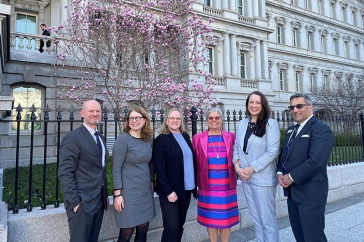
This past May, 4,736,000 people who have disabilities in the U.S. had jobs. That’s 3.2 percent more people with disabilities who worked than in May 2016, but still less than a third of all working-age people with disabilities.
And Andrew Houtenville ’97G has counted each of them.
“Our goal is to improve the lives of and opportunities afforded to people with disabilities, to support independent living and equal opportunity in employment, in healthcare — really, in all aspects of life.”
Not literally, of course, but Houtenville — director of research at UNH’s Institute on Disability (IOD) and an associate professor of economics at the Peter T. Paul College of Business and Economics — leads several national projects that collect data for organizations that can make a difference in the lives of people with disabilities.
“We basically go out and get every possible statistic available from the myriad government agencies that generate them,” says Houtenville. “Our goal is to improve the lives of and opportunities afforded to people with disabilities, to support independent living and equal opportunity in employment, in healthcare — really, in all aspects of life.”
In doing so, Houtenville and his team have created a one-stop shop for policymakers, advocates and researchers. The two major research projects he leads, both funded by the U.S. Department of Health and Human Services National Institute on Disability, Independent Living and Rehabilitation Research, have made the IOD a national leader in disability statistics.
Houtenville and his team release the Annual Disability Statistics Compendium and host a major conference in Washington D.C. to help policymakers and advocates use the information to advance the field and the lives of those with disabilities. In 2015, for instance, the U.S. Department of Justice (USDOJ) used these data to demonstrate the impact of a noninclusive employment policy in Oregon. The state settled a lawsuit with the USDOJ, in part due to Houtenville’s findings; Oregon is now working on adopting policy reforms to ensure that people with disabilities are employed in competitive jobs.
Employment, with its inextricable links to wealth, poverty and wellness, provides a powerful lens through which to view the lives of people with disabilities, who work at about half the rate those without disabilities do, Houtenville says. For the past 40 years, that rate has been on a frustrating slide, and Houtenville and the IOD have had a loud voice in the academic debate and policy solutions to that decline.
Bucking the number-obsessed stereotype of statisticians, Houtenville calls himself a scholar-advocate. “Some people would shrink at that statement, but I use my scholarship to advocate by choosing what hypothesis I want to test, by investigating what I think is important,” he says. “Of course, I cannot and do not choose the answers.”
Illustration by Daniel Baxter
Originally published in UNH Magazine Fall 2017 Issue
-
Written By:
Beth Potier | UNH Marketing | beth.potier@unh.edu | 2-1566
















































